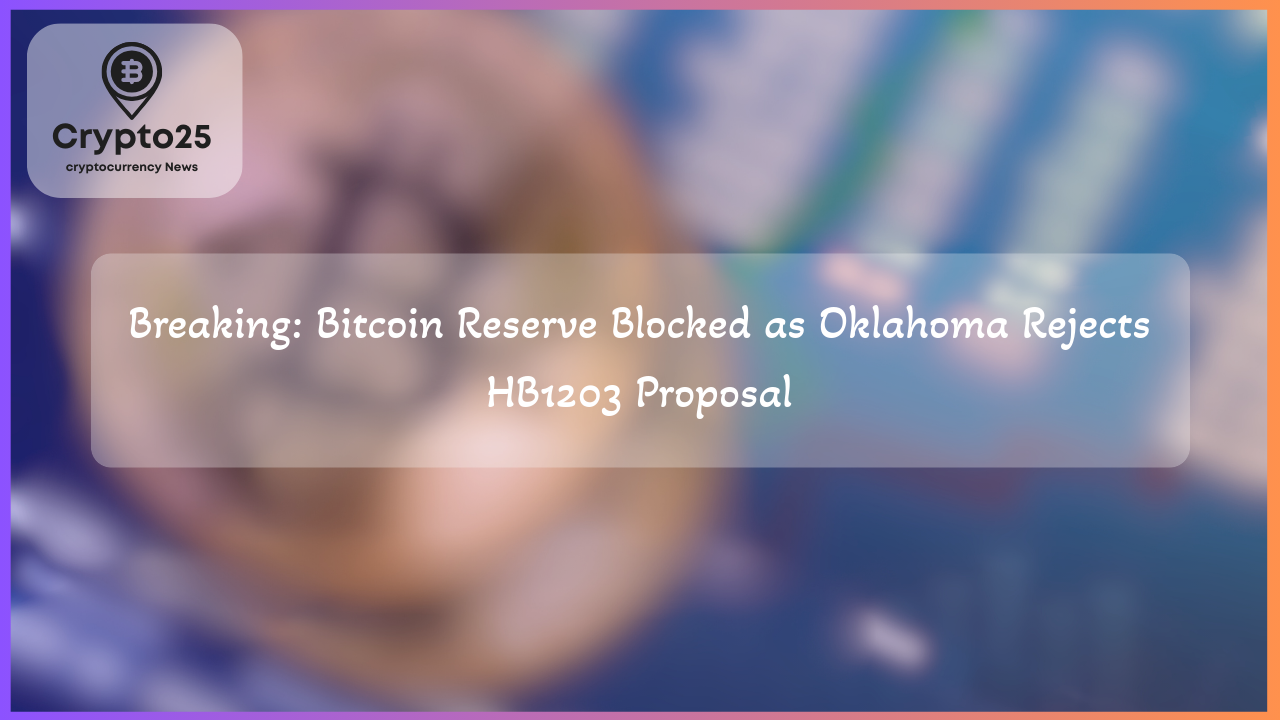
In a surprising twist, Oklahoma has withdrawn from the highly competitive Bitcoin Reserve Race after House Bill 1203 (HB1203) failed to secure approval in the Senate Revenue and Taxation Committee. The narrow 6–5 vote rejection highlights the ongoing debate surrounding state-level adoption of Bitcoin and other digital assets. Despite this setback, other states continue to push forward in developing cryptocurrency-based financial strategies.
### Oklahoma Exits the Bitcoin Reserve Race
Oklahoma’s withdrawal marks a significant turn in the race to integrate Bitcoin into state-level treasury funds. HB1203, known as the Strategic Bitcoin Reserve Act, proposed allowing the state treasurer to allocate up to 10% of treasury funds into Bitcoin and high-market-cap digital currencies. Furthermore, the bill aimed to incorporate innovative strategies like digital asset staking and provide state-managed portfolios with cryptocurrency investment options, including Bitcoin-focused retirement plans.
The legislation also included provisions requiring that taxes and fees paid in cryptocurrency be converted into U.S. dollars before being deposited into state accounts. Although HB1203 gained traction early in 2025, notably passing the House Government Oversight Committee with a 12–2 vote and the full House by a 77–15 margin, it faced resistance in the Senate committee. On April 14, six senators, including a mix of Republicans and Democrats, ultimately voted against the bill. This rejection officially sidelines Oklahoma in the competition to adopt Bitcoin as a strategic reserve asset—a race still led by states like Texas, Arizona, and New Hampshire.
### Oklahoma’s Early Crypto Ambitions: Where It Began
Once seen as an emerging leader in cryptocurrency regulation, Oklahoma had been at the forefront of advancing blockchain-focused legislation. In early 2025, State Senator Dusty Deevers introduced the Bitcoin Freedom Act (SB325), an ambitious proposal promoting Bitcoin integration across financial systems. The bill advocated for initiatives such as allowing state vendors and employees to transact using Bitcoin and framing Bitcoin as a potential hedge against inflation—a narrative that echoed widespread conservative support for the cryptocurrency.
This momentum had been building since 2024 when Oklahoma enacted the Bitcoin Rights Bill (HB3594), a landmark measure ensuring protections for digital asset holders and crypto miners. This legislation prohibited restrictions on private cryptocurrency wallets and supported compliant crypto-mining activities, from small-scale operations to industrial ventures. These efforts positioned Oklahoma as a crypto-friendly region, making the failure of HB1203 particularly notable. Despite these legislative setbacks, Oklahoma’s earlier achievements reflect the state’s openness to exploring blockchain innovation.
### What Does Oklahoma’s Decision Mean for the Future of Crypto Legislation?
The rejection of HB1203 comes amid increasing state-level interest in incorporating Bitcoin into treasury frameworks. While Oklahoma steps back, other states are doubling down on their crypto-friendly policies. Ohio, for instance, made headlines in late 2024 when Representative Derek Merrin introduced legislation to integrate Bitcoin into treasury reserves. Senator Sandra O’Brien followed with Senate Bill 57 (SB57), aiming to establish an Ohio Bitcoin Reserve Fund complete with a long-term holding provision. The initiative also included provisions to accept Bitcoin for tax payments.
Similarly, Pennsylvania is advancing its own strategy to allocate up to 10% of its state treasury into Bitcoin. Proponents of such policies argue that investing in BTC offers protection against economic instabilities and inflation, while critics point to potential volatility as a risk factor. Meanwhile, the federal government in Washington remains cautious, choosing to observe state-level experiments and corporate Bitcoin adoption rather than announce sweeping national reforms.
As more states examine the viability of Bitcoin reserves, Oklahoma’s previous legislative achievements—such as passing the Bitcoin Rights Bill—signal that the state isn’t entirely turning away from cryptocurrency. The rejection of HB1203 may be a temporary pause rather than a complete withdrawal from blockchain-backed financial innovation.
| Title | Details |
|---|---|
| Market Cap | $1.2 Trillion |
| HB1203 Initial Support | 77–15 House Vote |
| Top Crypto-Friendly States | Texas, Arizona, New Hampshire |
The conversation about cryptocurrency regulation in Oklahoma—and across the United States—is far from over. Despite HB1203’s failure, rising awareness and continued state-level initiatives demonstrate the persistence of cryptocurrency debates within institutional frameworks. As other states move forward, Oklahoma may soon revisit its approach in an effort to ensure it doesn’t get left behind in the rapidly evolving crypto economy.
